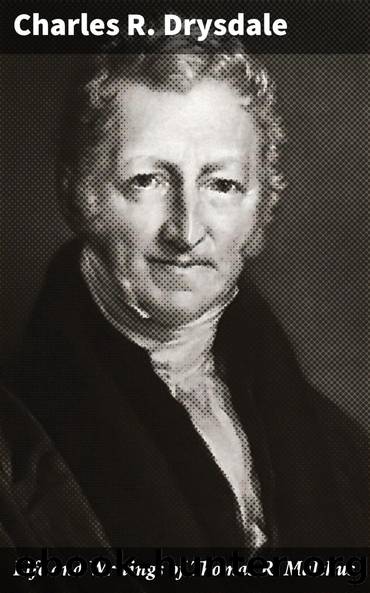Life and Writings of Thomas R. Malthus by Charles R. (Charles Robert) Drysdale

Author:Charles R. (Charles Robert) Drysdale [Drysdale, Charles R.]
Language: eng
Format: epub
Google: EzyDp7-nrA8C
Publisher: Standring
Published: 1887-01-15T02:44:18+00:00
CHAPTER IX.
OF POOR LAWS.
In Chapter V. of Mr. Malthusâs book iii., we have these luminous remarks of his on Poor Laws, which have been so often quoted by statesmen and philanthropists:â
âIt is,â says our author, âa subject often started in conversation, and mentioned always as a matter of great surprise, that, notwithstanding the immense sum which is annually collected for the poor in this country, there is still so much distress among them. But a man who looks a little below the surface of things would be much more astonished if the fact were otherwise than it is showed to be, or even if a collection universally of eighteen shillings in the pound, instead of four, were materially to alter it. Suppose that by a subscription of the rich, the eighteen pence or two shillings which men earn now were made up to four shillings, it might be imagined, perhaps, that they would then be able to live comfortably, and have a piece of meat every day for their dinner. But this would be a very false conclusion. The transfer of three additional shillings a day to each labourer would not increase the quantity of meat in the country. There is not at present enough for all to have a moderate share. What would then be the consequence? The competition among the buyers in the market of meat would rapidly raise the price from 8d. or 9d. to two or three shillings in the pound, and the commodity would not be divided among many more people than at present.
âWhen an article is scarce, and cannot be distributed to all, he that can show the most valid patent, that is, he that offers the most money, becomes the possessor ... and when subsistence is scarce in proportion to the number of the people, it is of little consequence whether the lowest members of the society possess two shillings or five. They must, at all events, be reduced to live upon the hardest fare and in the smallest quantity.
âA collection from the rich of eighteen shillings in the pound, even if distributed in the most judicious manner, would have an effect similar to that resulting from the supposition which I have just made; and no possible sacrifices of the rich, particularly in money, would for any time prevent the recurrence of distress among the lower members of society, whoever they were. Great changes might, indeed, be made. The rich might become poor and some of the poor rich; but while the present proportion between population and food continues, a part of society must necessarily find it difficult to support a family, and this difficulty will naturally fall on the least fortunate members.â
Malthus mentions that in a great scarcity which occurred in England in 1801, no less than ten millions sterling were given away in charity. In one case cited by our author, a man with a family received fourteen shillings a week from his parish. His common earnings were ten shillings a week, and his weekly revenue therefore twenty-four.
Download
This site does not store any files on its server. We only index and link to content provided by other sites. Please contact the content providers to delete copyright contents if any and email us, we'll remove relevant links or contents immediately.
Complete Works of John Buchan by John Buchan(374)
A FIGHTING MAN OF MARS by Edgar Rice Burroughs(365)
Prisoners of War in Britain 1756 to 1815 by Francis Abell(334)
Arsene Lupin vs. Herlock Sholmes by Maurice Leblanc(311)
Ireland In The New Century by Plunkett Horace Curzon Sir(302)
Hotwife Rescued--A Wife Sharing Multiple Partner Wife Watching Hotwife Romance Novel by Karly Violet(279)
Lord Palmerston by Anthony Trollope(272)
The Frontiers of Language and Nationality in Europe by Leon Dominian(271)
The Amateur Diplomat by Hugh S. Eayrs & Thomas B. Costain(268)
BY Anthony Trollope - The life of cicero . vol. 1 by 1881(259)
Boris Karloffâs Favorite Horror Stories by Boris Karloff(256)
Scraps by Jane Austen(249)
The Life of Jesus Critically Examined by Dr. David Friedrich Strauss by George Eliot--Delphi Classics (Illustrated) by George Eliot(228)
Delphi Works of Sir Arthur Conan Doyle (Illustrated) by Sir Arthur Conan Doyle(228)
Mr. Surprise Daddy: An Accidental Pregnancy Romance (Love, Accidentally) by Annabelle Love(206)
Siegfried and The Twilight of the Gods: The Ring of the Niblung II by Wagner Richard;(202)
The Thousand and One Days by Miss (Julia) Pardoe(177)
The First Book of Farming by C. L. (Charles Landon) Goodrich(174)
A Journey through Persia, Armenia, and Asia Minor, to Constantinople, in the Years 1808 and 1809 by James Justinian Morier(171)
